
As temperatures drop and the cold settles in, more than 80% of people grapple with “winter skin syndrome,” according to a 2019 Harris Poll. That’s because healthy skin likes consistency, says the American Academy of Dermatology, so the sudden chill outside, warm air indoors, and dry air all around takes a serious toll on your complexion. Cue: moisture loss, cracks in the skin barrier, and inflammation, all causes behind the dreaded dryness, flakiness, acne flare-ups, and redness common with winter skin.
Here’s a bright spot: Skin experts say simple homemade face masks for winter skin can help you get your glow back all season long. Here are the ingredients you might not have realized double brilliantly as all-natural skincare products.
6 Reasons You Look Older In Winter—and What You Can Do About It

What to use in a homemade face mask for winter skin
The trick to whipping up the perfect DIY face mask recipe is to keep it simple, including just the ingredients that suit the needs of your skin right now, says Nadir Qazi, DO, a board-certified physician, cosmetic dermatology surgeon, and founder of Qazi Cosmetic Clinic in Newport Beach, CA. Your skin may be struggling with winter weather, but its needs can also change based on other factors like hormones, stress, sleep, and food choices.
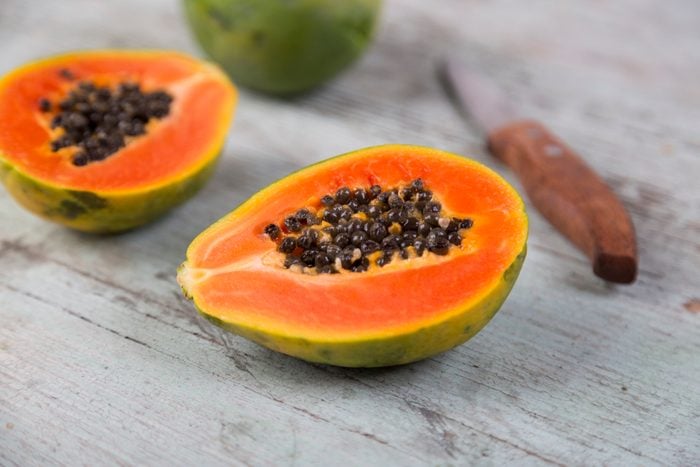
For acne: papaya
“Mashed papaya is an excellent ingredient in DIY face masks,” Dr. Qazi says. “It contains an enzyme called papain that may help to soothe skin irritations like chaffed and chapped skin, acne, or rosacea.”
Papaya is also a natural exfoliant that encourages cell turnover, enhances collagen production, and has high vitamin C content that may combat sun damage.
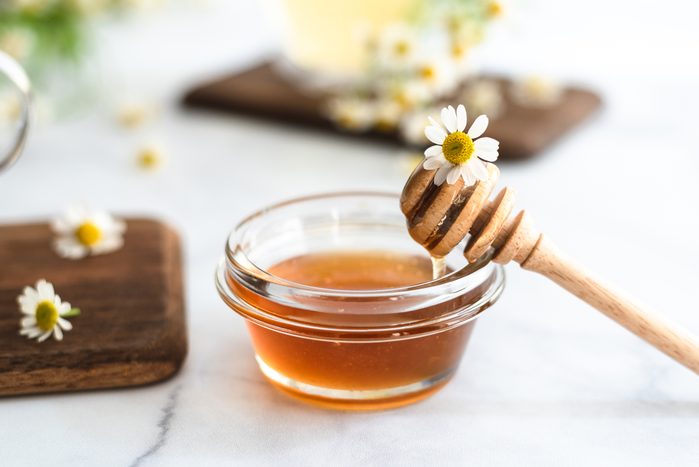
For dryness: honey
“Honey has been well-known for centuries and has been a prominent part of beauty routines since the ancient Egyptians,” Dr. Qazi says. “It is a natural humectant and draws moisture to the skin to hydrate it.”
Honey also softens coarse winter skin and has anti-inflammatory properties that can protect your skin from bacteria and fungi.
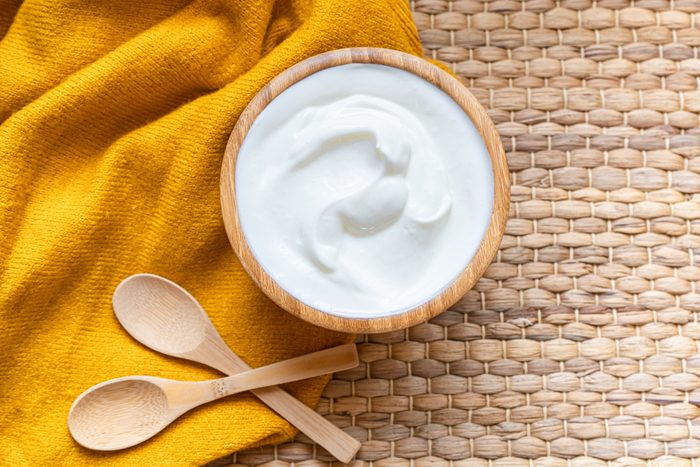
For improved skin texture: yogurt
Yogurt’s probiotics help to rebalance your skin’s pH, helping boost its moisture barrier. It also contains lactic acid, “an alpha hydroxy acid or AHA exfoliant that encourages cell turnover, removing dead skin cells and revealing fresh, vibrant skin underneath,” Dr. Qazi says.
As a bonus, “when applied as a cold mask, it will have immediate tightening and depuffing benefits,” adds Jennifer Fredette, licensed esthetician and director of skin care services at Massage Heights in Texas. For the best effects, go for plain Greek yogurt with no fruit or flavoring.
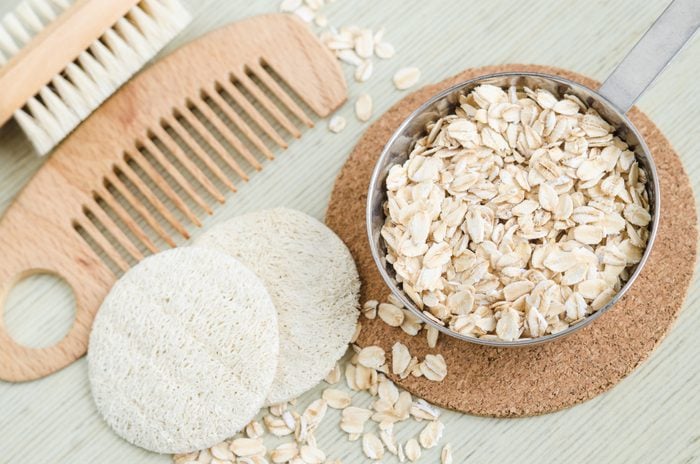
To soothe irritation: oatmeal
Oatmeal contains natural anti-inflammatories and antioxidants that work to soothe irritated skin and help protect it from damage, Dr. Qazi explains. It’s also great for those more prone to oily skin as it absorbs extra sebum, he says.
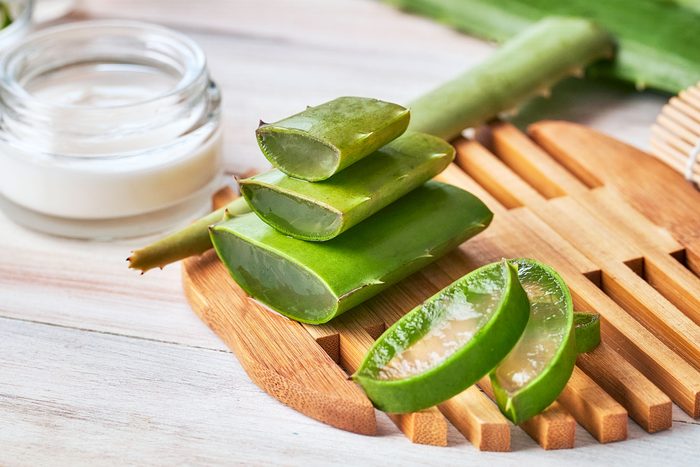
To rehydrate and refresh: aloe vera
Aloe vera is a natural humectant, which means it draws moisture into the skin—a must for dry winter skin. Its rich vitamin and antioxidant content also make it a natural soothing agent that can help reduce inflammation and redness, says Dr. Yoram Harth, a board-certified dermatologist and Medical Director of MDacne.
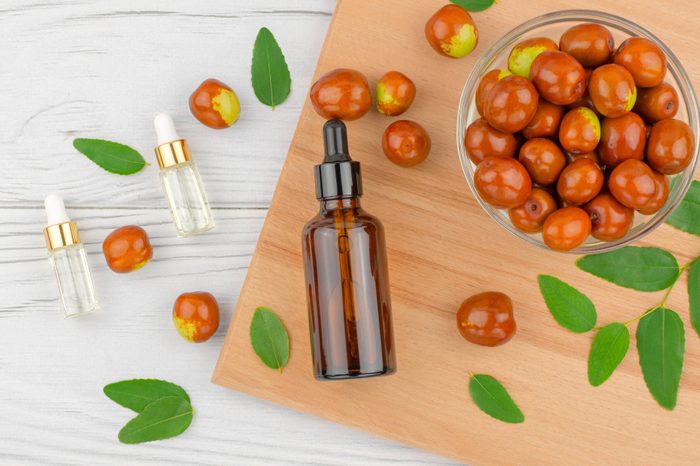
For chapped skin: jojoba oil
Jojoba oil is another natural ingredient that provides a serious moisture boost, says Alain Michon, MD, Medical Director at the Ottawa Skin Clinic. According to research, it also has an anti-inflammatory effect to soothe irritated skin and can even help manage acne breakouts.
Dermatologists Say This 1970s Anti-Aging Ingredient Is Still the Gold Standard for Gorgeous Skin
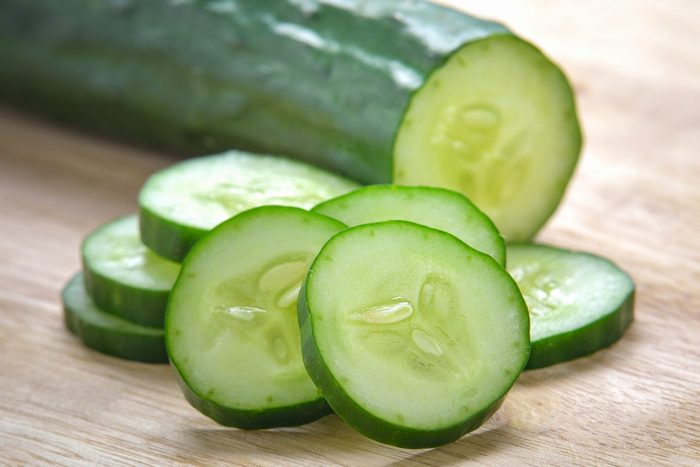
For tired-looking skin: cucumber
A cucumber is 96% water— so it can add some serious hydration to your skin, especially when mixed into thicker ingredients like honey and yogurt. It calms and soothes the skin, Fredette says, and delivers a hit of vitamin C and other nutrients that can wake up a dull complexion.
8 Vitamin C Hacks Derms Say Will Give Your Skin the Greatest Results
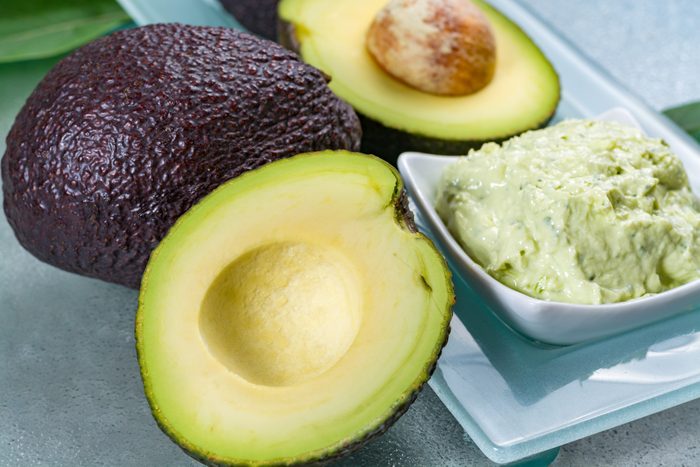
For redness: avocado
Avocados contain fats and vitamins that have strong anti-inflammatory effects, which can work to reduce redness and irritation, Fredette says. Those healthy fats are also mega-moisturizing, helping to maintain and protect the strength of your skin barrier. (Bonus: avocado is great for your hair, too.)
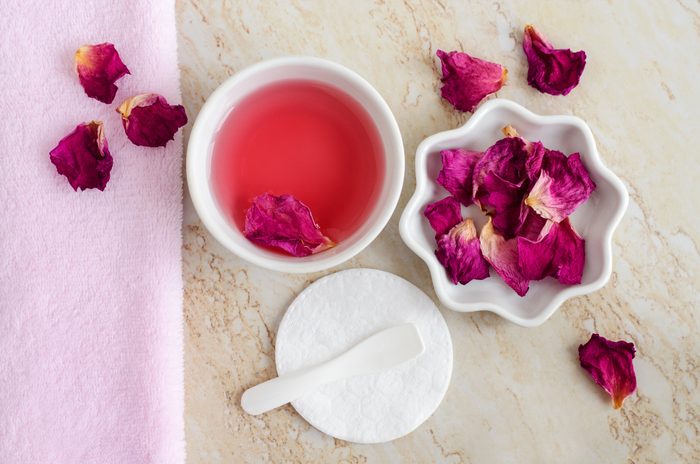
For some extra brightening: rose water
“Rose water is another great DIY face mask ingredient,” Dr. Qazi says. “It balances PH, brightens skin, soothes irritation, and minimizes the appearance of pores.”
Plus, rose water won’t just add a nice scent to your face mask—research shows that rose aromas have a relaxing, mood-boosting effect.
12 Things Dermatologists Do in the Winter That You Should Try
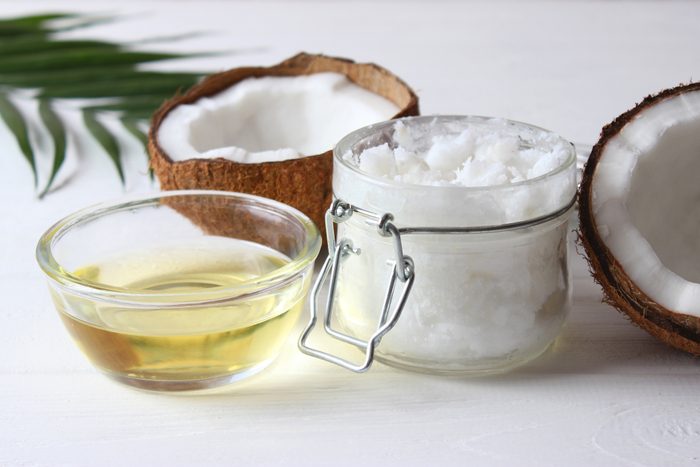
What to avoid in a homemade face mask
No matter what you use in a homemade face mask, the experts say it’s important to patch-test an ingredient first to make sure it suits your skin and doesn’t cause an adverse reaction. But there are also some trendy face mask additions that could do more harm than good.
“I would warn against using any ingredients that are very abrasive on the skin or any chemicals that where you cannot control the potency,” Dr. Michon advises. “Cinnamon, coffee, and vinegar have all been slated as DIY products to use in the past—but they put the skin at risk of irritation and superficial chemical burn.”
In the same vein, Dr. Qazi says to steer clear of using spices in at-home face masks. “Spices have many great benefits for the skin, like cinnamon or clove. A lot of them have anti-inflammatory or antiseptic properties,” he says. “However, the dosage can be challenging to regulate, and too much can burn the skin.” The same advice goes for essential oils—while many have a range of benefits, it’s tough to control the concentration and can easily trigger irritation and sensitivity, says Dr. Harth.
It can be tempting to use oils like olive oil and coconut oil in face masks as they do contain nutrients that moisturize and nourish the skin, Dr. Qazi adds. But they’re high on what’s called the comedogenic scale, which means they can easily clog your pores and cause breakouts.
You’ll also want to avoid combinations that are high on the acid or alkaline scale—like apple cider vinegar and baking soda—as these can make your skin very dry and irritated, Fredette says. “Another DIY [solution] I often see is using toothpaste as pimple patches,” says Dr. Michon. “I would advise against this completely—not only does it make a sticky mess, but it can actually irritate your acne more and lead to increased breakouts.”
